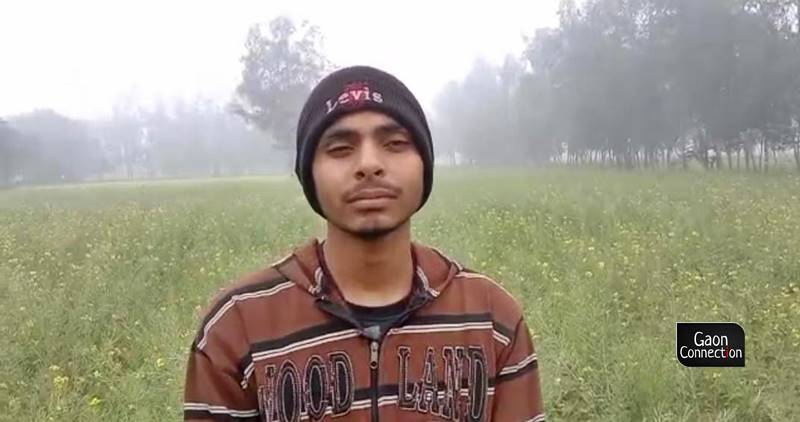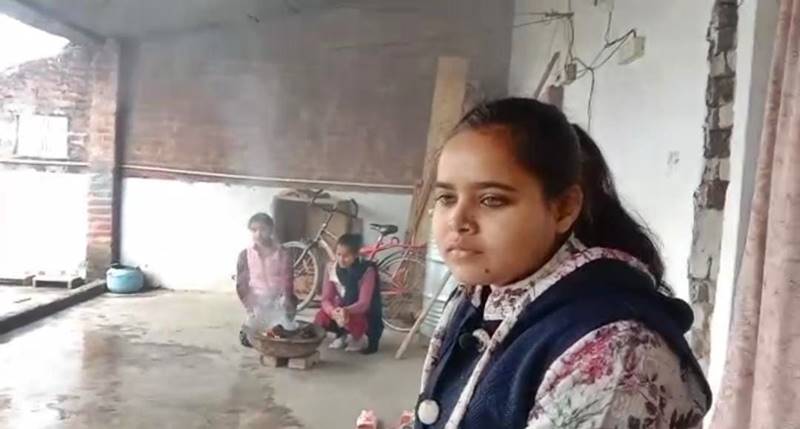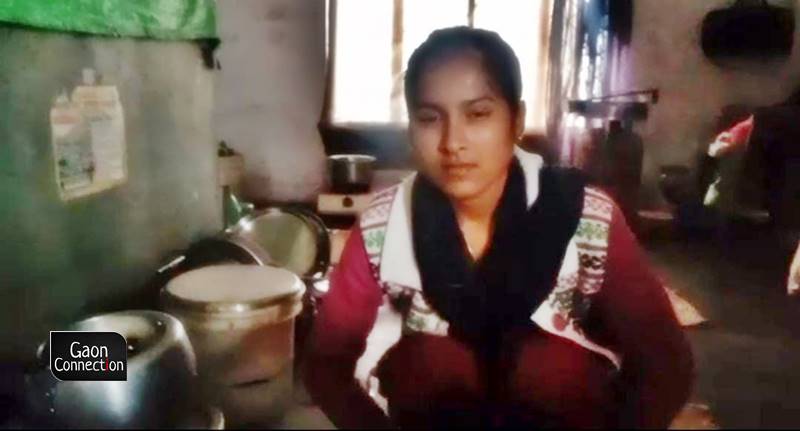‘What is our fault?’ — With schools shut and no internet access, rural students worry about the board exams
Board examinations are a month away and schools are shut due to the rising threat of the Omicron variant of COVID19. Rural students are worried as a majority of them have no access to smartphones or the internet to access online classes. They fear the digital divide will cost them their future.

Amrendra Awasthi has grown up watching his father work rigorously on the agricultural fields to earn a livelihood. The 17-year-old science student in the twelfth standard has always aspired to be able to contribute to his family’s livelihood but two years of COVID19 pandemic has shaken his confidence.
“Last year got wasted [as schools were shut] and my studies were badly affected. This year, the Omicron outbreak has again wreaked havoc on rural students like us. Our school is shut at a time we need our teachers the most,” a worried Amrendra, who has to soon appear for the board examinations, told Gaon Connection.
“The examiner who’ll check my answer sheet will not be able to see my hardships, I will only be assessed on the basis of what I write. What is our fault if we cannot afford online classes like sheheri bachche (children in urban areas),” he asked. Amrendra is the resident of Kes Rayi village in Suratganj block of Barabanki district in Uttar Pradesh.
Unlike the students in urban centres, a lot of whom have access to smartphones and the internet to access online schooling and prepare for the board examinations, majority of students like Amrendra in the villages of the country have neither phones nor the network to support virtual learning.

Also Read: In the midst of COVID-19, education technology – EdTech – has become the need of the hour
On January 16, the Uttar Pradesh government declared shutting down of schools from January 16 to January 23 in the wake of the rising COVID19 cases. After remaining shut for 18 months, the schools had reopened on September 1 last year. A number of states in the country continue to shut down educational institutes due to the threat of the Omicron variant of SARS-CoV-2. Meanwhile, the vaccination of children above the age of 15 years is underway in the country.
“My school was shut on December 31 for winter vacations and it was supposed to open on January 16 but this Corona has again caused school closure,” 16-year-old Muskan Jaiswal, student of class 10th and a resident of Barabanki’s Belhara, told Gaon Connection. “But only schools have been shut. People are out in the crowded markets, eating food, enjoying themselves. It’s as if only schools will cause Corona,” she complained.
Several parents pointed out that online classes were not an option for the children in rural areas whose future was at stake as board examinations were around the corner and these students had no one to guide them.

“We have a phone but the network is not so good to support online classes. All this is worrisome. I am concerned about my daughters’ future. I fear that the divide between the children in the cities and my daughters is even more now,” Phool Kumari Jaiswal, Muskan’s mother said.
Also Read: Education on hold: Amid the COVID lockdown, children in rural India will suffer the most
Digital divide leading to inequality of opportunity
According to a report by the United Nations Children Emergency Fund (UNICEF), an overwhelming majority of school-going students in India are unable to pursue education as they lack the digital tools to access online classes.
The UNICEF report titled COVID-19 and School Closures: One year of education disruption was published on March 2, 2021. It informed that merely 8.5 per cent of the students in India have access to the internet — a technological handicap that is at the cost of their constitutional right to education.
“My dream is to get a job and ensure that my father doesn’t have to work so hard. He works as a khetihar mazdoor (farm labourer). Paying my school fees itself is difficult, how can I expect my father to buy me a laptop or a smartphone?” asked Amrendra Awasthi.
The 17-year-old student, eldest amongst four siblings, said that he was hoping to get his doubts cleared by the teachers once his school reopens after winter vacations but the announcement of closure of schools as a measure to check the outbreak of the fast spreading Omicron variant of COVID19 dashed his hopes.
Meanwhile, about 100 kilometres away from Barabanki district, students in Unnao told Gaon Connection that they have to sustain extra expenses to ensure that they don’t lose out on their learning.
“The course of our subjects is far from complete. I cannot rely on the schools to get the syllabus covered as board examinations are crucial. Online classes are not helping and I have convinced my parents to get private tuition classes for me. Without these tuition, I cannot even think of preparing for the boards,” Sujit Kumar, a 16-year-old resident of Durjankhera village in the Sadar tehsil told Gaon Connection.
The fears of the rural students have been highlighted in the UNICEF report, too. “With every day that goes by, children unable to access in- person schooling fall further and further behind, with the most marginalized paying the heaviest price,” Henrietta Fore executive director, UNICEF, stated while releasing the report last March.
Girl students suffer the most
The impact of closure of schools is far more adverse for the female students who are expected to assist their mothers in household activities like cooking and cleaning. Several families are not comfortable with handing over smartphones to their teenage daughters.
Sitting beside her choolha (an earthen stove used for cooking), 17-year-old Pushpa Yadav told Gaon Connection that she believes that online classes can never be a substitute for classroom learning.

“I go to the school along with two of my siblings. When the school gets shut and online classes are announced, only one amongst the three gets to study. That is also only when papa is at home and willing to share his phone with us,” Pushpa, a class 12th student and a resident of Tadwa village in Barabanki, told Gaon Connection. “So basically, we learn next to nothing in online classes. It is such a tamasha (sham). Sometimes the network signal is not good enough for video streaming or a video call,” she added.
Meanwhile, Tarani Srivastava, a student of tenth standard in Kaitha village of Barabanki pointed out that parents’ lack of trust in handing over the phone to their children is also stressful to her.
“My parents are not comfortable with providing phones to us. They think we will misuse it. It’s very difficult to convince them otherwise. All this chaos and tension just to be able to study spoils my mood and I find it difficult to concentrate,” Srivastava told Gaon Connection.
Teachers worried about the board results
A chemistry teacher from Government Inter College (GIC) in Barabanki told Gaon Connection on the condition of anonymity that the response of students to online classes is abysmally low.
“Yesterday, on January 19, I conducted an online class. I had informed the student in advance about the class yet only one out of 35 students could join the class. Later, after a lot of hassle, a few more students joined but such classes cannot be used to teach students properly,” he said.
“We feel helpless. The students are in dire need of classes as the board examinations are knocking on the door. They will be held in March. With very few online classes being held successfully, I fear for the result of the exams,” he added.
Meanwhile, Viresh Verma, Principal of Parameshwar Inter College in Barabankitold Gaon Connection that the online classes in the rural areas have been found to be utterly unsuccessful. “As per my understanding, almost 96 per cent of the students are not able to learn through the online medium as there are multiple issues ranging from poor connectivity to the economically challenged households of these children,” he said.
It is important to note that in September, 2021, Uttar Pradesh Chief Minister Yogi Adityanath had appealed the education experts to suggest alternatives to online learning in the rural areas. While speaking at a public event in Varanasi, he had accepted that the connect between the schools and the rural students had been broken due to the ongoing COVID19 pandemic.
This year, in Barabanki district alone, a total of 63,099 students will appear in the upcoming board examinations for classes 10th and 12th which are held in March.
Written by Pratyaksh Srivastava.
With inputs from Sumit Yadav in Unnao.

